As we all know, Easter is a time that Christians all over the world mourn the death and celebrate the resurrection of their saviour, Jesus Christ.
Outside their holy scripture, the Bible, there are no indications of the existence of Jesus. Even in the Bible, things are pretty confusing. Christians with tell you there are no contradictions in the Bible, but there are literally hundreds. Many of these apply to the life of Jesus, their most important character.
Easter
It is Jesus whose life Christians supposedly try to emulate, and Jesus who gives them the name Christian. Reading the New Testament, the values of Jesus appear to be mostly good ones, though definitely not all of them. It probably wouldn’t be a bad thing if, on the whole, more people did act the way he did at least in relation to accepting all people equally.
Easter is obviously a pretty big deal in Christianity given it’s when they believe their saviour died “that we may have everlasting life”. Like many other atheists, the idea of worshiping someone for this reason strikes me as emotional blackmail. I didn’t ask Jesus to take responsibility for my sins, and who does he think he is to do this anyway? Apparently all I have to do to get to heaven is say I accept Jesus. If I don’t, anything I do wrong will result in me burning in hell for eternity, so no pressure!
As he so often does, Richard Dawkins said it best.
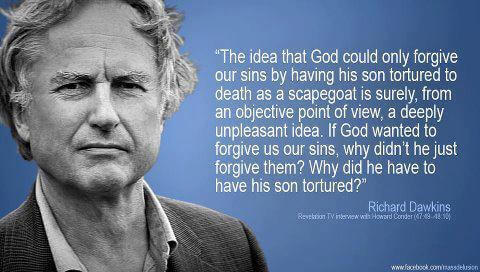
Then there’s this.

Quite frankly, I think that’s appalling. Worse still, in the West this idea has taken such hold that for hundreds of years anyone not accepting this piece of illogic as fact is seen as a Bad Person. Even in our supposedly enlightened world, a majority still see belief in a supernatural being as a requirement for morality.
Rosa Rubicondior: The Easter Challenge
Back in 2012, William Hounslow of the Rosa Rubicondior blog set ‘The Easter Challenge‘ for Christians. In it he set out all the contradictions in the Bible just relating to the resurrection of Jesus. He in turn got the data from Dan Barker’s 2009 book ‘Godless: How an Evangelical Preacher Became One of America’s Leading Atheists‘. Barker’s asks seventeen questions relating to the resurrection and gives all the different ways the gospels answer those questions.
Easter for Atheists
Over the years atheists have come up with a few ideas relating to the Easter myth which naturally make their way onto social media. Most of those below I got from Twitter.
First, let’s get a little of the history in here.
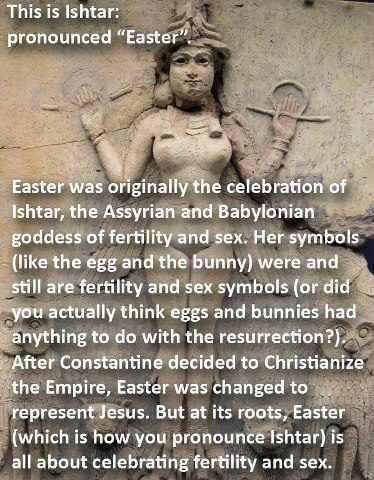
And here are a couple of classics from the Jesus and Mo series (the Author’s cartoon for this year is at the link).
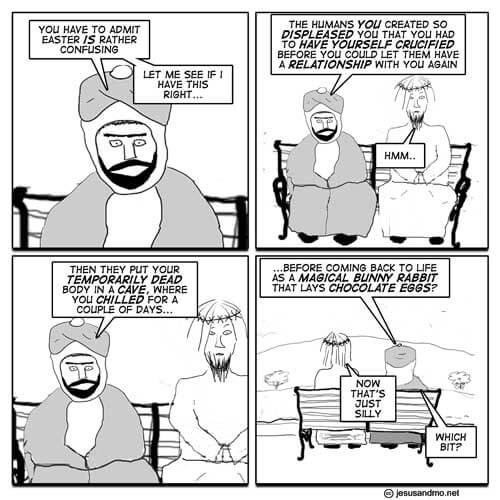

And a general selection.
- Jesus getting his nails done.
If you enjoyed reading this, please consider donating a dollar or two to help keep the site going. Thank you.






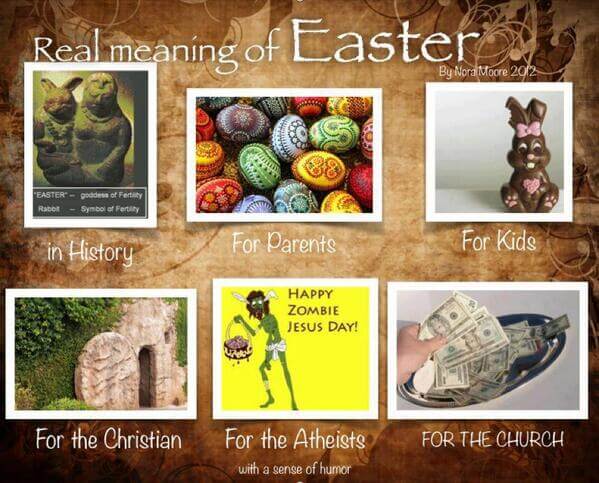

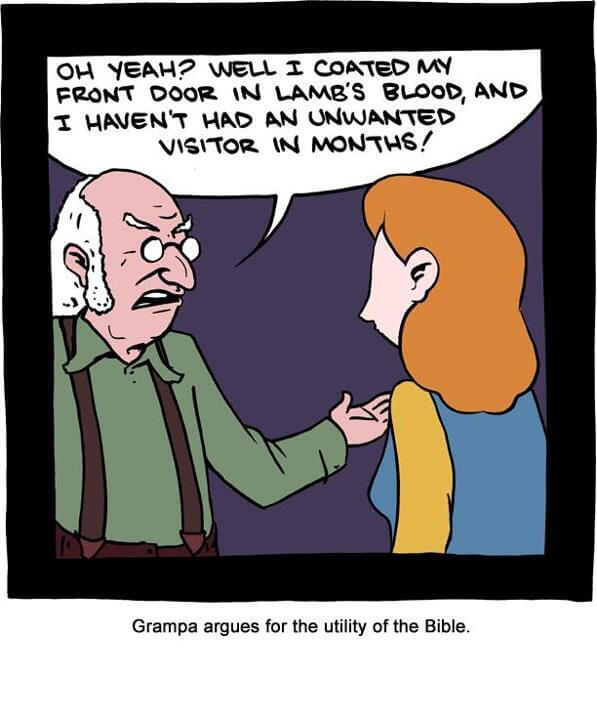

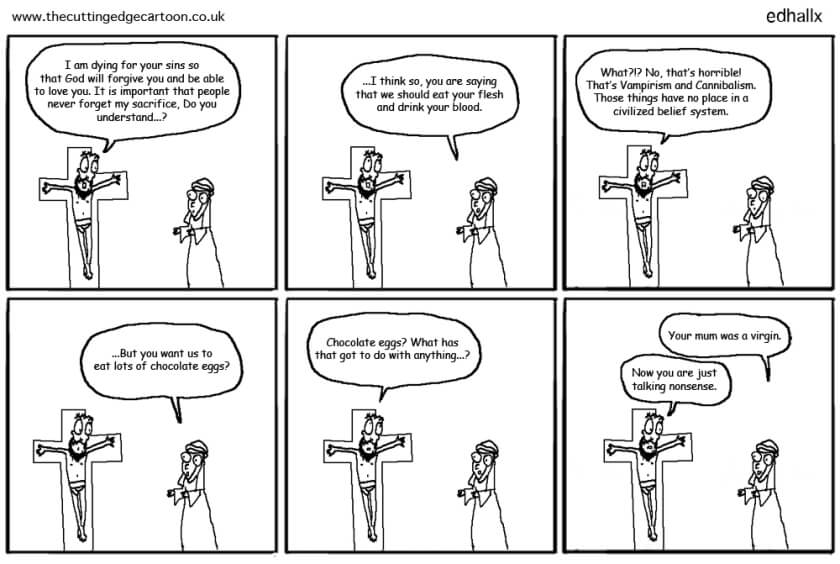








I suppose it would be uncharitable in this holy season to note that Dawkins’s theological acuity is on par with my neighbor’s deaf chihuahua’s comprehension of Mozart.
Yes it would. Your neighbour’s deaf chihuahua has never heard Mozart. Dawkins has read the Bible and some theology. One does not have to be an expert on a subject to have an opinion, as millions of people prove every day. Dawkins is just as entitled to his opinion as anyone else, and given his superior intellect and how widely read he is, his opinion is likely to be more interesting and more informed than most.
The chihuahua’s Christian name is Louie, but I like to call her Sparky.
I take it that you’re a good Christian, and obviously a staunch defender of the faity. How is it then that you say this dog has a Christian name? That sounds blasphemous to me. Did the dog receive its name upon being baptized or confirmed? And the dog’s “Christian name” is Louie, but it’s a female dog? Even more blasphemous, contra naturam (meaning God’s law).
So your neighbour’s deaf Chihuahua dog can sight read sheet music better than I can. Well, that’s not hard – the music teacher never succeeded in beating the idea of reading music into me, any more than he did the idea of listening to it.
OTOH, “your neighbour’s deaf Chihuahua” has a better chance of actually existing than your idea of a god does.
Say…how’s your Islamic theology? Any better than your neighbor’s deaf chihuahua’s musicology?
So, on what grounds do you therefore justify your infidel status within Islam?
Let’s say you actually are a brilliant Islamic scholar…can you read the Egyptian Book of the Dead in its original hieroglyphics? If not, how can you be certain that Set isn’t waiting to weigh your soul against his feather?
I happen to know a great deal more Christian theology than the average Christian — though, to be sure, there’re lots of theologians who can run rings around me. But since I’m a more knowledgeable theologian than most Christians and yet I don’t believe, shouldn’t that mean that I’m a better authority on the subject than them, and that my lack of belief should trump their belief?
The reality of the situation, of course, is that one doesn’t need to know all the finer details of a particular bit of nonsense in order to decide that it’s not worth wasting your time on. And when you realize that there’s no more reason to think that Perseus was born of a virgin mother and the Heavenly Father in accordance with the prophecy than there is to think that Jesus was, you’ll understand that Christianity not only doesn’t pass the “sniff” test, it stinks to high heaven.
Cheers,
b&
I concur that we should use our finite earthly lifespans as productively as circumstances allow. The wise prioritize. I doubt I’ll ever take time to become a tax expert, or memorize the biographies and stats of every World Series pitcher, or know definitively how many fish are in the sea. I don’t need to know the finer details of a particular bit of nonsense (atheism, say) to intuit that it’s a dead end, but I’m always open to new information. The thing is to always keep seeking the truth. And if you do that, you’ve found God whether or not you choose to acknowledge it.
As easily the most dogmatic and ideological of the commenters that frequent Heather’s blog, you’ve shown almost no openness to new information. That bodes ill for your search for truth, let alone god. Happy holidays though.
Thanks, and holiday wishes to you as well, old friend.
If by new information you are referring to the dags business, that was indeed all new to me. I was completely open to it, but I confess I had no idea what to do with the newfound knowledge.
I believe your characterization is biased and false (not to say ad hominem). But let’s start with clean sheet: Go ahead, hit me with something I haven’t heard.
A review of the last few years of comments on Heather’s posts would show that my characterisation is certainly not false and therefore not ad hom, either (and you’re a good one to talk). I most certainly am biased against this sort of engagement, which others than just me have accurately labelled trolling, and have no reason to provide you with a clean sheet. If you really want one, you’ll create it yourself by showing you’re able to engage in good faith and less ideologically in future. I won’t be holding my breath.
Yes, but which god?
And how do you know that whichever god you have in mind really is the (presumably) one true real god?
No theist can give a satisfactory answer to those questions, because the only justification ever given is, “faith.”
How much faith do you have in that used car salesman? How much faith do you have that you’ll die (or at least be horribly injured) if you jump off the bridge?
When you understand why faith is absurd in such situations, you’ll understand why it’s equally absurd when it comes to gods.
Cheers,
b&
You may as well ask, which truth. Truth is simple, in the sense of being one and indivisible. As far as we can tell, the totality of truth must far exceed the capacity of a human mind. And similarly, as soon as you think you have God in mind, then you can be sure it isn’t God.
Indeed, faith does not provide any answers, if that is your point. Faith is simply the vision, fortitude and heart to set out for an unknown country.
I’m glad we all have something to agree on – that faith provides no answers. If it’s what you need to have heart for your journey, I’ve little issue. It’s not what I need for mine, but so be it.
@Ken: You miss the point, again. Without faith there is no journey.
It’s a sad philosophy indeed that leads one to deny even another’s journey.
Just offering an observation. Not denying anyone’s God-given right to believe what they want.
That’s exactly the problem. Before the Enlightenment, not many believed people did have a right to believe what they wanted to believe (which, of course, isn’t God-given, though I assume you were saying that to get a rise). It’s the religious who insist people have to believe in a god or the God. Many even insist that atheists are lying when they say they don’t believe. Some regimes still kill those who admit to not believing, or believing in the wrong god. Some Christian rulers used to do that, and others still do it both for not believing in a religion or not believing some other state-imposed orthodoxy.
And before you bring up regimes like communist Russia, their atheism wasn’t real atheism. They tried to replace unquestioning belief in a god with unquestioning belief in the state or the leader of the state. That’s not what we got from the Enlightenment, which doesn’t, of course, preclude religion.
And zero points for the straw man too.
Everybody has the right to be wrong.* Yet almost nobody acts accordingly, as if that were true — not the religious nor the irreligious; not the enlightened nor the benighted; not the modern nor the old-fashioned; not “real atheists” nor fakes; not intellectuals nor illiterates; not illiberal campus radicals, and certainly not the vast preponderance of humanity. If you want to lament that lamentable reality, I’ll join you. But it’s human nature, not an attribute of any particular group.
Yet as stated above, so long as you keep seeing after the truth, God accompanies you whether or not you choose to acknowledge Him. (I’ll leave it to you to sort out the “real atheists” from the fakes. I don’t pretend to understand the mindset.)
(*Yes, of course, our rights are God-given. Just being honest, not provocative.)
We’ve never hesitated to acknowledge your right to be wrong. As “faith does not provide any answers”, we in fact celebrate that right here all the time.
@K: Everyone has the right to be droll (which is not to say they have the gift).
Fortunately, not trying to make art. Could be avoided completely if only you’d stop pretending the subjective is objective.
One question on Dawkins logic. The concept here (as he well knows) isn’t subject a (God) using subject B (his son) as a scapegoat. The concept here is subject a (God) taking the punishment himself. You cannot attack Christian soteriology on ground of God being an immoral torturer of the innocent, by means of disregarding all its theology. Dawkins is not a fool and he has taken time to study what Christian’s believe. This is “straw man” logic, and totally unworthy of him as an academic thinker – much more akin to a bigot who is prepared to twist/distort an argument to make his point.
So how would you describe Christian soteriology? What difference does it make whether you accept that Jesus and God (and the Holy Spirit) are all the same being or not? The result is the same. Even that was just decided by Constantine at Nicea. The leaders of the church got together, gave their arguments and voted. Then all the votes and arguments were burnt and Constantine announced what would be doctrine henceforth.
You’ve criticized Dawkins’ logic and understanding of the concept, but haven’t said what you think the correct understanding should be.
A most entertaining and interesting post for an atheist Eastertime. I especially enjoy the offerings in the “general selection.”
My one quibble is that I doubt very much that “Easter” is linguistically (or otherwise) related to Ishtar. For various reasons, it sounds to me suspiciously like folk etymology. I’ve studied a bit of ancient Near Eastern history, lore, and languages at UC Berkeley, have been acquainted with a number of scholars in the field, and I never heard anything like that. I’d certainly have remembered if I had. Further, though I didn’t study Sumerian, I did study a bit of Akkadian, which contains a lot of Sumerian and was written in Cuneiform. Not infrequently in these classes, we were presented with folk etymologies (which abound in anything related to biblical studies or anything biblically related, which includes most of the ancient NE), and this sure smells like one to me. I’d been inclined to go with the derivation from the Germanic goddess, Oestra (and var. sp.), but now read that may be in question as well. That, though, certainly seems more plausible. Anybody who knows more about this, please chime in and correct me if needed.
And while I’m at it, how about a perfect atheistic easter egg: Deviled easter eggs, of course. Here’s the recipe https://www.justataste.com/pickled-deviled-eggs/. Gorgeous to behold, even better to consume.
I suspect there’s some conflation of deities going on here, as there is also a “Celtic” (whatever that really meant, 2000 years ago) deity reported by the Romans (Tacitus, IIRC) under the name of “Oestra” (other transliterations are available; vowels to taste) who had a spring festival, and probably others. Given that all of these societies (Babylonian, Hittite, “Celtic”, Achaean, Roman) have linguistic roots in “proto-IndoEuropean,” then it’s not a long or implausible (IMO) route to thinking of a “proto-IndoEuropean Pantheon”.
But I’m not a theologian, so I can admit that’s wild speculation and not be in the least bit concerned if someone blows holes in it. Other people – j.a.m. for an example – seem to have some emotional investment in their belief in the gods they invent inside their own heads.
I have an old pal, whom I haven’t talked to in quite a while, who’s an Indo-European philologist and also a Semiticist. I must get his opinion on the matter.
I must admit, before I copied that from Twitter, I always thought that it came from the Celtic goddess, whose name I thought was Eostre, and the holiday was merged with the Christian one. I’d be interested to know if there’s any general agreement.
St. Bede said in the 8th century that the English word derives from the name of the Anglo-Saxon goddess Ēostre. According to Wikipedia (which has good article on the subject), the OED accepts Bede’s account. But in any event, the derivation of Anglophone nomenclature is neither here nor there, when the name familiar to most Christians comes from the Greek and Latin “pascha”.
I’d take issue with the “mostly.” Indeed, once you put the pleasant-sounding quotes in context, you’re left with basically nothing that’s truly praiseworthy.
Or, as I like to put it, even Hitler kissed babies. For that matter, read the original Nazi party platform, and you’ll find about as stuff in there that either we all can agree with outright or that is just as easy to “reinterpret” into profundity as anything Jesus said.
Even in the Sermon on the Mount…in the very introduction, Jesus condemns to infinite torture all men who’ve ever looked admiringly upon a woman and failed to immediately gouge out his own eyes. And this is a love god?
That, of course, is trivial compared to all the “bring not peace but a sword” and similar verses. Luke 19 is particularly nasty — it’s a parable of the coming Armageddon, and it ends with the Jesus stand-in character commanding his followers to kill all who won’t join them in following him…exactly as Jesus himself is going to do “any day now.”
All those famous lovey-dovey quotes everybody keeps trotting out are similarly plucked from their context. “Turn the other cheek” isn’t even remotely like Dr. King’s civil disobedience, for example, but rather much more about telling slaves to shut up and accept their lot and not disturb their masters because they’ll be in Heaven soon anyway. It’s a recipe for hellish disaster and tragedy, not peaceful lovingkindness.
Cheers,
b&
You’re quite right Ben – I am talking about how most Christians like to interpret verses like “turn the other cheek”, rather than their real meaning. And I, of all people shouldn’t do that. The one I always like to mention, because Christians go on so much about “family values” is how Jesus told people they should abandon their families, leave their jobs etc and follow him.
Excellent point. Many Sunday schools are filled with straightforward Enlightenment value lessons draped in Christian symbolism — and that’s a fair description of the morality of perhaps even the significant majority of Christians.
Or: if you get your morality from Sunday school, it’s probably not that bad…but, if you get it from the Bible itself, you’re almost certainly a monster of some kind.
I would compare and contrast Dr. King with William Lane Craig, for example. Dr. King was as Christian as they come, but his morality was pure Enlightenment untainted by Jesus. Craig, on the other hand, would have us feel sorry for the poor Israelite warriors for raping the Midianite girls after killing their parents. Must have been a traumatic experience for the soldiers to trust in YHWH so completely as to do such a great and gloriously good act as they did, no?
Cheers,
b&
“The appearance of such a person, more divine and more human than any other, and standing in closest unity at once with God and man, is the most significant and hopeful event in human history. This divine quality or this unity with God was not something thrust upon Jesus from above, but it was a definite achievement through the process of moral struggle and self-abnegation.” — Martin Luther King, Jr.
“The appearance of such a person, more divine and more human than any other, and standing in closest unity at once with God and man, is the most significant and hopeful event in human history. This divine quality or this unity with God was not something thrust upon Jesus from above, but it was a definite achievement through the process of moral struggle and self-abnegation.” — Martin Luther King, Jr.
Would that God send us many more such “untainted” people.
Amen to that.
I always chuckle when I read interpretations of the bible from people intent on finding fault. Talk about plucking quotes from their context.
“Turn the other cheek” is about peaceful, loving kindness in the face of cruelty – if you think the only choices you have are civil disobedience, violent retaliation or ‘shut up and accept your lot’, then you have a very limited view of your potential to change the world.
Try reading the book with an open mind instead of an agenda.
Just because I don’t believe foxes can talk doesn’t mean Aesop’s fables have nothing to teach me about life.
The bible story celebrated at Easter is not about the supernatural power of Jesus, the supposed son of a mythical God. Remove all the supernatural mumbo-jumbo and examine it in context (including historical and cultural context) and you’ll see that it’s about the power and potential of a single, ordinary human life to transcend death.
Yes, I think Christianity has misinterpreted its entire reason for being. That’s something they’re going to have deal with, along with the many other problems they’ve created for themselves. But don’t throw the baby out with the bath water.
And, yet, it is the Christians who inevitably and doggedly ignore the context. The “kill zem all” line at the end of Luke 19 is supposed to be some mush-headed nonsense about inner spiritual struggle with impure thoughts…and, yet, the whole thing is an allegory for Armageddon when Jesus himself will, indeed, “kill zem all.”
You may well be fooling yourself by chanting the context / allegory / whatever mantra…but you’re the only one you’re fooling.
…and you’re left with nothing but the conjunctions and prepositions.
What baby? This is a book whose main “protagonist” destroyed the entire planet before committing mass genocide multiple times — and whose son, the alternate protagonist, is the gatekeeper for Hell itself.
Do you search for the “baby” in the bathwater of Mein Kampf? Twist it into not an existential struggle of the pure Aryan race against the detested filthy Jews hellbent on corruption and destruction, but instead an Enlightened symbolic treatise exploring the universal human truth of the battles we face with our inner counterproductive desires?
No?
So why waste your time doing the exact same with the Bible?
Cheers,
b&
A very edifying Easter message:
http://en.radiovaticana.va/news/2017/04/15/pope_francis_homily_at_easter_vigil,_2017/1306003
Were this an exercise in literary analysis, there’d be nothing remarkable about such an opening paragraph.
Yet, as one continues to read, it becomes painfully obvious that he means that perfectly literally. He really does think this is a reliable eyewitness account of an actual historical event, and that the Platonic idealization of Love was physically present and had just died.
Again — perfectly reasonable as poetry…but by taking it this seriously, he’s as dangerously out of touch with reality as those Star Wars fans who think little green puppets really can lift starships out of swamps by waving their hands and grunting with serious constipation.
The man is completely unmoored from reality, and really should get some professional mental health care.
Cheers,
b&
That you think “poetic” is an antonym for “serious” suggests that Francis is not the one with a literalism problem.